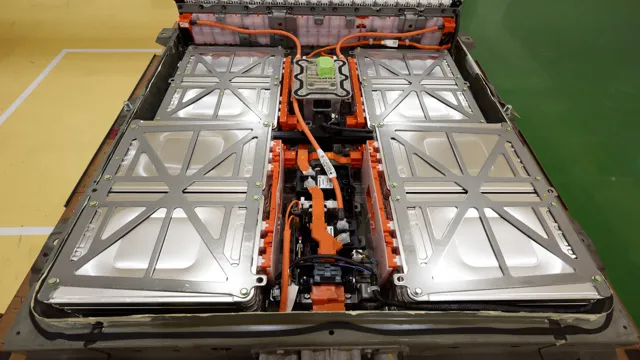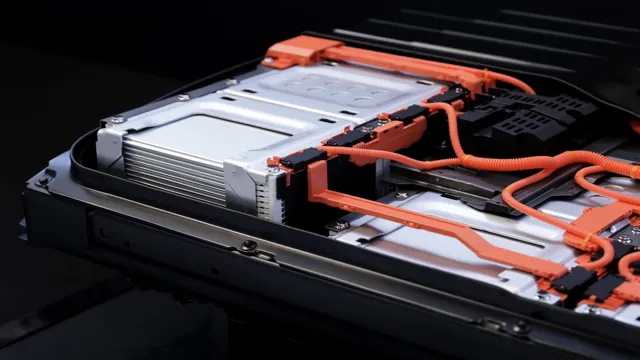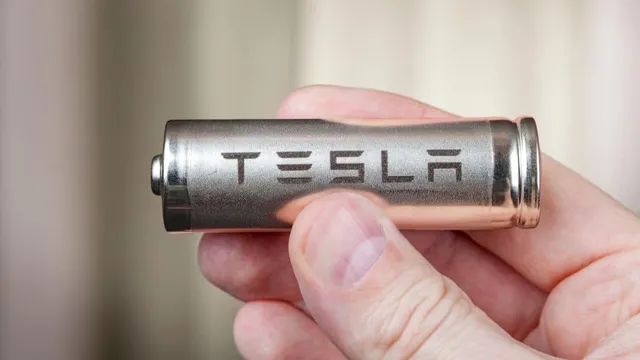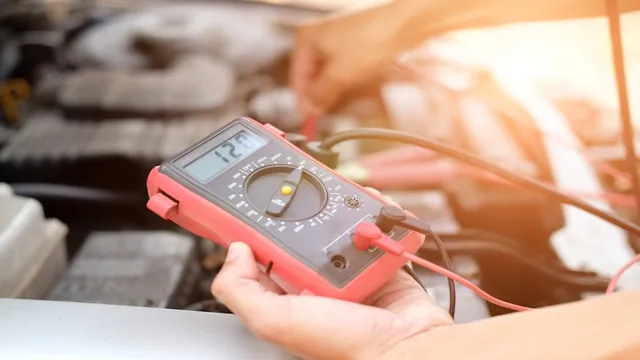Power Up Your Ride: Exploring the Latest Technologies in Electric Car Batteries for a Smoother and More Efficient Drive
Electric cars have revolutionized the automobile industry by providing environmentally friendly alternatives to traditional gas-powered vehicles. However, one of the biggest challenges that electric cars face is the limited driving range caused by their battery constraints. That’s where the breakthrough innovation of “Better Batteries” comes in.
Scientists and engineers are constantly working to develop new types of batteries that are more energy-dense, affordable, and efficient. Their ultimate goal is to produce batteries that provide longer driving ranges, faster charging times, and greater safety compared to current lithium-ion batteries. Research in this field has led to advancements such as solid-state batteries, which use a solid electrolyte rather than a liquid electrolyte to improve safety and energy density.
Additionally, companies are experimenting with nanomaterials, special coatings, and other forms of lithium-ion batteries that have the potential to transform the electric car industry. As the world shifts towards a cleaner and more sustainable future, the development of better batteries for electric cars will play a crucial role in making this vision a reality. Get ready to see faster, more efficient cars that can travel further distances with fewer charging times than ever before.
The future is electric, and it’s looking brighter every day.
Current Battery Limitations
Electric cars have gained popularity over the years because they provide an eco-friendly form of transportation that reduces greenhouse gas emissions. However, one of the biggest limitations of electric cars is the battery life. The current battery technology used in electric cars can only provide a distance of about 100 to 300 miles on a single charge, which may not be sufficient for some consumers.
This has led to the need for better batteries for electric cars, which can provide longer ranges and faster charging times. Scientists and engineers are continuously researching and developing new battery technology, such as solid-state batteries, to improve the performance of electric cars. The development of better batteries for electric cars will not only improve the driving experience but also contribute to a cleaner and sustainable environment.
Short Driving Distance
One of the biggest limitations of electric cars today is their short driving distance, which is largely due to current battery technology. While advancements have been made in recent years, electric car batteries still cannot match the range of traditional gasoline-powered vehicles. This means that electric car owners must plan their trips carefully and often rely on public charging stations.
However, it’s important to remember that driving an electric car is a different experience altogether. It’s a more environmentally friendly option that saves you money on fuel costs over time. In fact, it’s like having a hybrid vehicle that always runs on electricity.
So, while the current battery limitations might seem like a downside, it’s only a small part of the equation. The benefits of driving electric cars far outweigh the drawbacks, and as technology continues to evolve, electric cars will in turn continue to improve.
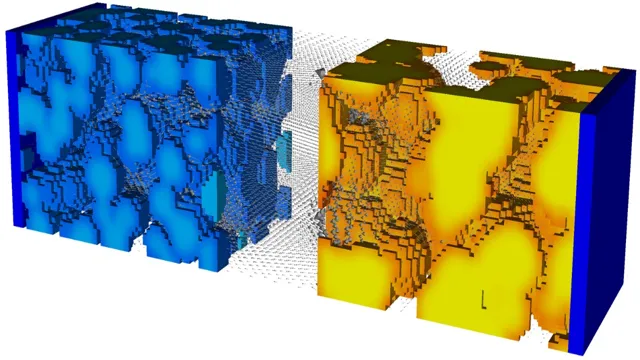
Long Charging Time
The current limitations of batteries have resulted in longer charging times for our electronic devices. This is because batteries often cannot handle fast charging speeds without overheating or losing capacity. Additionally, the materials used in current batteries have limited energy density, meaning they can only hold so much power before needing to be recharged.
Despite the advancements in battery technology, such as the adoption of lithium-ion batteries, there is still a long way to go to meet the demands of modern devices. As a result, manufacturers are constantly searching for new ways to improve battery efficiency and capacity, ensuring consumers can enjoy their devices without the frustration of a long wait for a full charge.
Advancements in Battery Technology
As electric cars continue to gain popularity, the demand for better batteries has increased. Fortunately, advancements in battery technology are making this a possibility. One such advancement is the use of solid-state batteries, which provide improved safety, energy density, and charge/discharge rates compared to traditional liquid electrolyte batteries.
Another development is the use of silicon anodes, which offer higher energy densities and longer lifespans. Additionally, the use of lithium-sulfur batteries provides a potentially more cost-effective option for electric vehicles. With these and other developments, it won’t be long until electric cars achieve greater ranges and become more affordable for the average consumer.
The future looks bright for better batteries in electric cars!
Solid-State Batteries
Solid-state batteries are the newest technological innovation in the world of batteries and have the potential to revolutionize the industry. These batteries use solid electrolytes instead of liquid ones, which makes them safer and more efficient. Solid-state batteries also have a higher energy density, which means they can store more energy in a smaller and lighter package.
This is a huge advantage for devices like electric cars that rely on batteries for power. In addition, solid-state batteries have a longer life, as they do not experience the same degradation as traditional batteries. As of now, solid-state batteries are still in development, but they hold incredible promise for the future of batteries and energy storage.
With further research and development, they could become the standard for batteries in a variety of applications.
Graphene Batteries
Advancements in Battery Technology have been a savior in the ever-growing demand for more powerful, long-lasting batteries. Graphene Batteries are a new technological advance that has been gaining popularity in recent years. Graphene is a form of carbon with a unique atomic structure that is both incredibly strong and lightweight.
It has been found to be an excellent conductor of electricity, making it a perfect fit for batteries. Graphene batteries have several advantages over traditional lithium-ion batteries. They have faster charging times, longer lifespan, and can be made thinner and lighter.
The incorporation of Graphene into batteries offers exciting possibilities, including expanding the range and capacity of electric vehicles and improving battery life for portable devices. Graphene batteries are still in the early stages of development, but they have the potential to revolutionize the battery market, leading to a reduction in the usage of non-renewable resources and a shift towards a more sustainable future.
Lithium-Sulfur Batteries
Lithium-sulfur batteries are the latest innovation in battery technology that promises to revolutionize the energy storage landscape. The main advantage of these batteries is their high energy density, which is about five times higher than the conventional lithium-ion batteries used in most electronic devices. Additionally, lithium-sulfur batteries are cheaper, more environmentally friendly, and have a longer lifespan than lithium-ion batteries.
One of the biggest challenges of this technology is its limited cycle life and low conductivity, which can result in reduced performance over time. However, scientists are working on improving the technology by developing new cathode and anode materials that can enhance the battery’s performance and durability. With ongoing research and development, lithium-sulfur batteries are poised to play a significant role in the energy storage sector and help us achieve a sustainable future.
Impacts on the Electric Car Industry
The electric car industry has been growing in popularity over the years as people become more conscious of their carbon footprint and the impact of fossil fuels on the environment. One of the major challenges faced by this industry is the availability of better batteries for electric cars. Currently, electric car batteries are heavy, expensive, and have limited range.
But with advancements in technology, scientists are constantly working towards creating better batteries that are lighter, cheaper, and have longer range. If successful, this could revolutionize the electric car industry as it would make electric cars more accessible to the masses. With better batteries, electric cars would become more practical for daily use, eliminating range anxiety and allowing people to travel longer distances without constantly having to recharge their car.
As a result, the demand for electric cars would increase, leading to a decrease in the demand for fossil-fuel powered cars. Overall, the development of better batteries for electric cars would have a significant impact on reducing our reliance on fossil fuels and transitioning towards a more sustainable future.
Increased Range and Efficiency
With the increasing advancements in technology, the electric car industry is experiencing a significant shift with the addition of increased range and efficiency. The improved range of electric cars is becoming an essential factor that impacts consumers’ purchasing decisions, as they seek cars that meet their daily mileage needs. The development of batteries with high energy density is enabling electric car manufacturers to produce vehicles with better range capability.
Additionally, the increasing efficiency of electric cars has brought the cost of owning and operating an electric vehicle down, making them more appealing to budget-conscious drivers. As a result, this has led more people to consider electric cars as a viable alternative to traditional fossil-fuel powered vehicles. These technological enhancements are set to significantly impact the electric car industry, leading to increased demand for electric cars globally.
Reduced Maintenance and Costs
One of the most significant impacts that reduced maintenance and costs have on the electric car industry is increased affordability for consumers. Electric cars require less maintenance than gas-powered vehicles, allowing drivers to save money on repairs and upkeep. Moreover, electric cars don’t require oil changes, which is a significant expense for traditional gas-powered vehicles.
With lower costs of ownership and maintenance, electric cars are becoming more accessible to a broader base of consumers, not just early adopters or staunchly eco-friendly drivers. As a result, the market for electric cars is expanding rapidly, and the prices of electric vehicles are becoming more competitive with traditional cars. In essence, this means that buying an electric vehicle is no longer a niche market choice, but a practical and affordable option for all drivers.
By reducing the overall cost of ownership, the electric car industry’s reduced maintenance costs are driving the shift towards a greener and more sustainable automotive industry, one affordable ride at a time.
Future Innovations for Better Batteries
As electric cars become more popular, research is focused on developing better batteries that can provide longer ranges and faster charging times. Some of the future innovations that could make this possible include solid-state batteries that use a solid electrolyte instead of a liquid one, which could improve the safety and energy density of batteries. Another promising innovation is lithium-sulfur batteries, which have the potential to store even more energy than current lithium-ion batteries.
Additionally, researchers are exploring the use of sodium-ion batteries, which could be a more cost-effective option than traditional lithium-ion batteries. While these technologies are still in development, they hold great promise for the future of electric cars, providing drivers with more efficient and sustainable options. In the future, we can expect better batteries for electric cars that offer longer ranges, faster charging times, and are more affordable for consumers.
Conclusion
In conclusion, the race for better batteries is the driving force behind the future of electric cars. With each technological advancement, the limitations of range and charging speed are being dismantled. Soon enough, the convenience of owning an electric car will be on par with that of a gas-powered vehicle.
So don’t let range anxiety deter you from taking the electric plunge, because the future is charged up and ready to go!”
FAQs
How do better batteries benefit electric cars?
Better batteries provide longer range for electric cars and reduce the need for frequent charging, resulting in greater convenience for the drivers.
Is there any research being conducted to develop better batteries for electric cars?
Yes, several research organizations and companies are investing in the development of advanced battery technologies to enhance the performance of electric cars.
Are better batteries cost-effective for electric car manufacturers?
Yes, better batteries reduce the manufacturing cost of electric cars as they require fewer battery cells to achieve the desired performance and range.
How does the use of better batteries impact the environment?
Better batteries reduce the carbon footprint of electric cars, resulting in reduced emissions and pollution levels compared to gas-powered vehicles.
